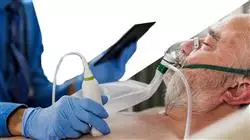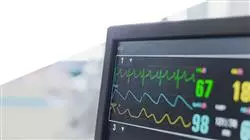University certificate
The world's largest faculty of medicine”
Why study at TECH?
You will delve into the diagnoses of potentially reversible causes of cardiac origin. And in just 6 weeks!"

Occasionally, Trauma occurs where patients present with Pulseless Electrical Activity (PEA), potentially leading to a lack of effective blood perfusion throughout the body. In turn, the consequences are serious and potentially life-threatening if not addressed in the right way. For example, this can lead to damage to vital organs such as the brain, heart, kidneys and liver. In these cases, it is crucial that experts act quickly, since early treatment can make the difference in the recovery of patients.
Aware of this reality, TECH has implemented a Postgraduate certificate that will address in detail the diagnosis of pseudo-ESPA. The didactic materials, prepared by an experienced teaching staff, will go into the use of imaging tests to obtain accurate information on the state of health of limbs such as the heart.
Likewise, the physicians will delve into algorithms for clinical decision making. Along the same lines, they will analyze in depth the most advanced diagnostic and therapeutic processes, in order to offer the highest quality to critical users. This program will also include multiple case studies, so that the graduates can develop their studies as if they were dealing with real cases.
It should be noted that the program is based on a 100% online methodology, allowing students to complete it comfortably and at their own pace. For the analysis of its contents, students will only need an electronic device with Internet access, since the schedules and evaluation chronograms can be planned individually. Along the same lines, the syllabus is supported by the innovative Relearningteaching system, which consists of the reiteration of key concepts to guarantee their assimilation. At the same time, mixing the learning process with real situations will allow the acquisition of practical skills in a natural and progressive way, without the extra effort of memorizing.
You will master Transesophageal Echocardiography in Cardiorespiratory Arrest and be at the forefront of healthcare technology"
This Postgraduate certificate in Imaging Technology in Cardiorespiratory Arrest contains the most complete and up-to-date scientific program on the market. The most important features include:
- The development of case studies presented by experts in Imaging Technology in Cardiorespiratory Arrest
- The graphic, schematic, and practical contents with which they are created, provide scientific and practical information on the disciplines that are essential for professional practice
- Practical exercises where the self-assessment process can be carried out to improve learning
- Its special emphasis on innovative methodologies
- Theoretical lessons, questions to the expert, debate forums on controversial topics, and individual reflection assignments
- Content that is accessible from any fixed or portable device with an Internet connection
Do you want to perform the most accurate assessments for the recovery of spontaneous circulation? Bet on TECH and experience a quality leap in your career"
The program’s teaching staff includes professionals from the field who contribute their work experience to this educational program, as well as renowned specialists from leading societies and prestigious universities.
The multimedia content, developed with the latest educational technology, will provide the professional with situated and contextual learning, i.e., a simulated environment that will provide immersive education programmed to learn in real situations.
This program is designed around Problem-Based Learning, whereby the professional must try to solve the different professional practice situations that arise during the academic year For this purpose, the students will be assisted by an innovative interactive video system created by renowned and experienced experts.
You'll tackle the BLUE Protocol at the best digital university in the world, according to Forbes"

Relearning will allow you to learn with less effort and higher performance, involving you more in your professional specialization"
Syllabus
Developed by a renowned teaching staff, this academic itinerary will deal in detail with the impact of ultrasound in the global control of the patient in Cardiorespiratory Arrest. In this sense, the syllabus will delve into the different existing protocols, including the FEER. Also, students will be able to make an effective distinction in terms of results between transthoracic echocardiography and transesophageal echocardiography. In addition, the contents will emphasize the usefulness of lung ultrasound for the follow-up of lesions.

TECH provides you with video summaries and clinical cases so that you can easily keep up to date with Imaging Technologies in Cardiorespiratory Arrest"
Module 1. Imaging Technology in Cardiorespiratory Arrest (CRA)
1.1. Indications of Ultrasound Study in CRP
1.1.1. Epidemiology
1.1.2. Echocardiography
1.1.3. Pulmonary Ultrasound
1.2. Use of Intra-PCR Ultrasound: Diagnostic Phase
1.2.1. Differential Diagnosis
1.2.2. Diagnosis of Potentially Reversible Causes of Cardiac Origin
1.2.3. Diagnosis of Pseudo-ESPA
1.3. Use of Intra-PCR Ultrasound: Advanced Diagnostic Phase
1.3.1. Diagnosis of Potentially Reversible Causes of Non-Cardiac Origin
1.3.2. Assessment of the Normal Position of the TOT
1.3.3. Assessment of Recovery of Spontaneous Circulation
1.4. FEER Protocol (Focused Echocardiographic Evaluation in Resuscitation) I: Preparation Phase
1.4.1. CPR and Preparation of the Equipment
1.4.2. Execution and Imaging
1.4.3. Resumption of CPR
1.5. FEER Protocol (Focused Echocardiographic Evaluation in Resuscitation) II: Evaluation phase
1.5.1. Interpretation and Communication
1.5.2. Determination of Underlying Causes
1.5.3. Verification of Correct Intubation
1.6. FEER Protocol (Focused Echocardiographic Evaluation in Resuscitation) III: Implementation Phase
1.6.1. Decision-Making Algorithms
1.6.2. Ultrasound in the Development of Life Support
1.6.3. Advanced Diagnostic and Therapeutic Processes
1.7. FEER Protocol (Focused Echocardiographic Evaluation in Resuscitation) IV: Resuscitation Phase or Prognostic Phase
1.7.1. Post CPR Care
1.7.2. Resuscitation
1.7.3. Prognostic Study
1.8. Other Protocols
1.8.1. FEEL
1.8.2. CAUSE
1.8.3. E-FAST
1.8.4. RUSH
1.8.5. BLUE
1.9. Education and Training
1.9.1. Training Criteria
1.9.2. Protocols
1.9.3. Simulation
1.10. Use of Transesophageal Echocardiography in CPR
1.10.1. Differential Elements with Transthoracic Echocardiography
1.10.2. Indications
1.10.3. Technique

A high-intensity program that will allow you to advance quickly and efficiently in your learning"
Postgraduate Certificate in Imaging Technology in Cardiorespiratory Arrest
Imaging technology in cardiorespiratory arrest (CRA) plays a fundamental role in the diagnosis and management of critical medical emergency situations. If you want to obtain the knowledge and skills necessary to perform in this field, you've come to the right place. At TECH Global University you will find the Postgraduate Certificate in Imaging Technology in Cardiorespiratory Arrest that will help you achieve your goals. The foundations of this program were designed with the best methodologies specialized in online learning, this will facilitate the development of your Postgraduate Certificate in a completely autonomous and practical way; to receive your lessons you only need to have a device connected to the internet. As you progress through the curriculum, you will explore the fundamentals of cardiorespiratory arrest and how imaging technology can transform medical response. This module lays the foundation for understanding how imaging can play a crucial role in decision making during emergency situations. In doing so, you will become an expert in the field, able to lead teams and use cutting-edge technologies to improve medical resuscitation.
Get your degree from the world's largest online medical school
Want to be at the forefront of resuscitation techniques? We are your ideal choice. This program offers advanced knowledge on the use of imaging technologies to improve accuracy and efficacy in critical situations. Over the course of the program, you will learn how to use advanced imaging techniques to quickly assess the situation during cardiorespiratory arrest. From ultrasonography to tomography, this module focuses on how these tools can provide vital information for resuscitation. In addition, you will explore how to integrate imaging data into resuscitation protocols. This module addresses real-time image interpretation and how this information can guide decision making to improve the effectiveness of resuscitation maneuvers. Want to learn more? Join us and make a difference in critical emergency care. Register now and take your knowledge to the next level - we look forward to seeing you!







